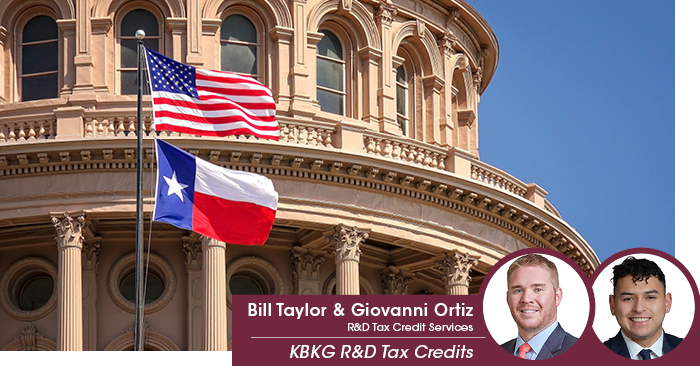By Bill Taylor and Giovanni Ortiz | Research & Development Tax Credits
On June 1, 2025, Texas lawmakers passed Senate Bill 2206 legislation that significantly enhances the state’s R&D Tax Credit structure. The Governor signed this bill into law on June 17, 2025. Effective for franchise tax reports due on or after January 1, 2026, this bill not only increases the value of the existing credit but also aligns the state’s definitions and procedures more closely with federal standards under IRC Section 41. Key changes include:
- Franchise Tax Credit Rate Increase – The allowable credit percentage for qualified research expenses will increase from 5% to 8.722%
- Repeal of Sales and Use Tax Exemption – The current sales and use tax exemption for qualified R&D property (Texas Tax Code Sec. 151.3182) will be repealed effective January 1, 2026
- Federal Alignment and Streamlining – The credit will now be directly linked to Line 48 of IRS Form 6765, incorporating federal definitions and referencing the applicable federal law for the year in question
- New Administrative Framework – Subchapter T – A new structure is established to house the revised credit program, removing the previous requirement to choose between the sales tax exemption and franchise credit
- 20-Year Carryforward and Refund Provisions – The 20-year carryforward remains in place, and certain taxpayers may qualify for a limited refund of unused credits
Implications of the Legislative Changes
The passage of this legislation represents a pivotal modernization of Texas’s R&D Tax Credit regime, offering more predictability and administrative ease for businesses engaged in qualified research. Key implications include:
- Simplified Compliance – By aligning the state credit more closely with the federal credit, taxpayers can more easily substantiate claims using existing IRS documentation, reducing the administrative burden
- Improved Audit Clarity – The legislation directly addresses historical audit controversies around qualified research expenditures and introduces clear standards for documentation, IRS procedures, and statistical sampling
- Consolidated Incentive Path – The repeal of the sales tax exemption simplifies the decision-making process for taxpayers, consolidating all benefits into a single, more valuable franchise tax credit
Benefits to Texas-Based Companies
The enhanced R&D credit provides a compelling incentive for businesses to invest in innovation within Texas. Notable benefits include:
- Increased Credit Value – The higher percentage allows companies to capture a larger return on eligible R&D expenditures
- Long-Term Planning Confidence – Although no specific sunset date is written into the law, the removal of the 2026 expiration date enables companies to build long-term R&D strategies with greater certainty
- Attractiveness to Innovators – The updated framework makes Texas more competitive with other states offering generous R&D incentives, particularly in industries like manufacturing, energy, technology, and life sciences.
Conclusion
To better assist clients and businesses nationwide, KBKG continues to monitor both federal and state level legislative changes, like Senate Bill 2206. Contact a KBKG expert today to evaluate how this passing might affect R&D claims in the state of Texas.
About the Authors
Bill Taylor | Principal – Research & Development Tax Credits
Bill Taylor is a Principal for KBKG’s Research and Development (R&D) Tax Credit Consulting practice. Based in Dallas, TX, Bill has over 10 years of experience providing federal tax consulting services to companies of all sizes within various industries, including technology… Read More
Giovanni Ortiz | Sr. Tax Specialist – Research & Development Tax Credits
Giovanni Ortiz is a Senior Tax Credit Specialist at KBKG, working out of the firm’s Dallas office. With over two years of experience, he specializes in identifying and securing tax credits for clients, helping businesses maximize their financial benefits through expert analysis and tailored… Read More




